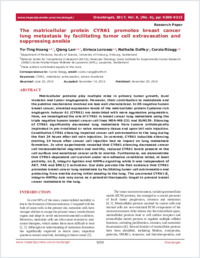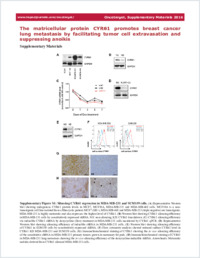The matricellular protein CYR61 promotes breast cancer lung metastasis by facilitating tumor cell extravasation and suppressing anoikis
- Huang, Yu-Ting Department of Medicine, Faculty of Science, University of Fribourg, Switzerland - National Center for Competence in Research (NCCR), Molecular Oncology, Swiss Institute for Experimental Cancer Research (ISREC)-Ecole Polytechnique Fédérale de Lausanne (EPFL), Lausanne, Switzerland
- Lan, Qiang Department of Medicine, Faculty of Science, University of Fribourg, Switzerland - National Center for Competence in Research (NCCR), Molecular Oncology, Swiss Institute for Experimental Cancer Research (ISREC)-Ecole Polytechnique Fédérale de Lausanne (EPFL), Lausanne, Switzerland
- Lorusso, Girieca Department of Medicine, Faculty of Science, University of Fribourg, Switzerland - National Center for Competence in Research (NCCR), Molecular Oncology, Swiss Institute for Experimental Cancer Research (ISREC)-Ecole Polytechnique Fédérale de Lausanne (EPFL), Lausanne, Switzerland
- Duffey, Nathalie Department of Medicine, Faculty of Science, University of Fribourg, Switzerland
- Rüegg, Curzio Department of Medicine, Faculty of Science, University of Fribourg, Switzerland - National Center for Competence in Research (NCCR), Molecular Oncology, Swiss Institute for Experimental Cancer Research (ISREC)-Ecole Polytechnique Fédérale de Lausanne (EPFL), Lausanne, Switzerland
-
29.11.2016
Published in:
- Oncotarget. - 2016, vol. 8, no. 6, p. 9200–9215
English
Matricellular proteins play multiple roles in primary tumor growth, local invasion and tumor angiogenesis. However, their contribution to metastasis and the putative mechanisms involved are less well characterized. In ER-negative human breast cancer, elevated expression levels of the matricellular protein Cysteine-rich angiogenic inducer 61 (CYR61) are associated with more aggressive progression. Here, we investigated the role of CYR61 in breast cancer lung metastasis using the triple negative human breast cancer cell lines MDA-MB-231 and SUM159. Silencing of CYR61 significantly decreased lung metastasis from tumors orthotopically implanted in pre-irradiated or naive mammary tissue and upon tail vein injection. Constitutive CYR61 silencing impaired cancer cell extravasation to the lung during the first 24 hours after tail vein injection. In contrast, CYR61 inducible silencing starting 24 hours after cancer cell injection had no impact on lung metastasis formation. In vitro experiments revealed that CYR61 silencing decreased cancer cell transendothelial migration and motility, reduced CYR61 levels present at the cell surface and sensitized cancer cells to anoikis. Furthermore, we demonstrate that CYR61-dependent cell survival under non-adhesive conditions relied, at least partially, on β1 integrin ligation and AMPKα signaling while it was independent of AKT, FAK and ERK1/2 activation. Our data provide the first evidence that CYR61 promotes breast cancer lung metastasis by facilitating tumor cell extravasation and protecting from anoikis during initial seeding to the lung. The uncovered CYR61-β1 integrin-AMPKα axis may serve as a potential therapeutic target to prevent breast cancer metastasis to the lung.
- Faculty
- Faculté des sciences et de médecine
- Department
- Médecine 3ème année
- Language
-
- English
- Classification
- Biological sciences
- License
-
License undefined
- Identifiers
-
- RERO DOC 288710
- DOI 10.18632/oncotarget.13677
- Persistent URL
- https://folia.unifr.ch/unifr/documents/305539
Other files
Statistics
Document views: 97
File downloads:
- pdf: 191
- Supplementary material: 161

